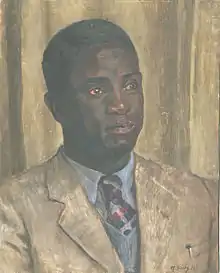Kenneth Dike
Kenneth Onwuka Dike (17 December 1917 – 26 October 1983[1]) was a Nigerian educationist, Igbo Nigerian historian and the first Nigerian Vice-Chancellor of the nation's premier college, the University of Ibadan.[2][3] During the Nigerian civil war, he moved to Harvard University.[4] He was a founder of the Ibadan School that dominated the writing of the History of Nigeria until the 1970s.[5] He is credited with "having played the leading role in creating a generation of African historians who could interpret their own history without being influenced by Eurocentric approaches."[6]

Career
Born in Awka, eastern Nigeria, Kenneth Onwuka Dike was educated in West Africa, England and Scotland. He attended Fourah Bay College, Sierra Leone and also Durham University for his BSc, the University of Aberdeen for his MA,[7] and King's College London for his PhD. During the 1960s, as a member of the University of Ibadan's history department, he played a pioneering role in promoting African leadership of scholarly works published on Africa. As the head of the organizing committee of the First International Congress of Africanists in Ghana in 1963, he sought for a strengthened meticulous non-colonial focused African research, publication of research in various languages including indigenous and foreign, so as to introduce native speakers to history and for people to view African history through a common eye. He was the first director of International School Ibadan.[8] In 1965 he was elected chairman of the Association of Commonwealth Universities.[6] Ebere Nwaubani argues that Dike was the first modern scholarly proponent of Africanist history.[9] His publications were a watershed in African historiography. With a PhD from London, Dike became the first African to complete Western historical professional training. At the University College of Ibadan, he became the first African professor of history and head of a history department. He founded the Nigerian National Archives, and helped in the founding of the Historical Society of Nigeria. His book Trade and Politics in the Niger Delta 1830-1885 dealt with 19th-century economics politics in the Niger Delta. He focused on internal African factors, especially defensive measures undertaken by the delta societies against imperialist penetration. Dike helped create the Ibadan School of African history and promoted the use of oral evidence by African historians.[10]
Publications
His publications include the following: Report on the Preservation and Administration of Historical Records in Nigeria (1953), Trade and Politics in the Nigeria Delta 1930-1890 (1956), A Hundred Years of British Rule in Nigeria (1957), The Origins of the Niger Missions (1958).[11]
References
- "Kenneth O. Dike Dies In a Nigerian Hospital". The New York Times. 13 November 1983. ISSN 0362-4331. Retrieved 20 October 2017.
- J. Gus Liebenow (1986). African Politics: Crises and Challenges. 388 of A Midland book. Indiana University Press. p. 191. ISBN 978-0-253-3027-55.
- Richard A. Joseph (2014). Democracy and Prebendal Politics in Nigeria. 56. Cambridge University Press. p. 52. ISBN 978-1-107-6335-37.
- "Kenneth O. Dike Dies In a Nigerian Hospital". The New York Times. 13 November 1983. ISSN 0362-4331. Retrieved 31 May 2020.
- Utilisateur, Super. "Kenneth Onwuka Dike (1962 - 1967)". ias-ibadan.org. Retrieved 31 May 2020.
- Keith A. P. Sandiford, A Black Studies Primer: Heroes and Heroines of the African Diaspora, Hansib Publications, 2008, p. 151.
- "Kenneth O. Dike Dies In a Nigerian Hospital". The New York Times. 13 November 1983. ISSN 0362-4331. Retrieved 3 January 2018.
- Emmanuel Kwaku Akyeampong; Henry Louis Gates (2012). Dictionary of African Biography, Volumes 1-6. Oxford University Press, USA. p. 201. ISBN 9780195382075.
- "After Ade Ajayi, will history end? (II)". Latest Nigeria News, Nigerian Newspapers, Politics. 20 August 2014. Retrieved 30 May 2020.
- Ebere Nwaubani, "Kenneth Onwuka Dike, 'Trade And Politics,' and the Restoration of the African in History", History in Africa: A Journal of Method, 2000, Vol. 27, pp. 229-248
- "Institute of African Studies of Ibadan - Past Directors". ias-ibadan.org. Retrieved 30 May 2020.
- Toyin Falola, The History of Nigeria, Greenwood Press, 1999.
